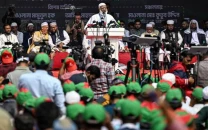Talk of peace stirs up Qaeda-Taliban tensions
In the wake of Afghan Taliban reconciliation talks, Qaeda feels increasingly abandoned in its fight against West.

Times are hard for al Qaeda in Afghanistan and Pakistan. The network has been weakened significantly by US drone strikes on their hideouts, last May's killing of founder Osama bin Laden and by finances drying up.
And since the Afghan Taliban declared themselves in favour of talks with the United States in Qatar that could help end a decade of war in Afghanistan, al Qaeda has felt increasingly abandoned in its fight against the West.
As far as it's concerned, talking to the Americans is treason.
“Al Qaeda blames us. They tell us ‘why are you letting us down, as we helped you when you were down?’” an Afghan Taliban official told AFP.
“We’re not happy with the Doha process,” a source close to al Qaeda confirmed to AFP. “We want the war to continue in Afghanistan and Pakistan.”
After taking power in 1996, the Taliban regime allowed al Qaeda to base itself in Afghanistan, taking advantage of fierce codes of hospitality and alliances made during the 1980s jihad against the Soviets in Afghanistan.
But the alliance cost the Taliban dear. They refused to hand over bin Laden to the Americans after the September 11, 2001 attacks, the United States invaded and their regime collapsed within weeks.
The Americans ruled out any negotiations and the Taliban fled across the border into Pakistan’s lawless tribal belt, where they found support among al Qaeda fighters, giving birth to a new stage in their relationship.
al Qaeda strengthened its links with Pakistani extremist groups, including the umbrella Tehreek-e-Taliban Pakistan (TTP), which pledged allegiance and in 2007 launched a bloody insurgency against the US-allied government in Islamabad.
In Afghanistan, the conflict only worsened, making it increasingly evident that there could be no military victory for anyone.
US President Barack Obama’s announcement that Nato combat troops would withdraw in 2014 opened the door to a possible return to power for the Taliban.
But Washington has conditioned peace on the Taliban cutting all ties with al Qaeda. Saudi Arabia has also made its involvement in peace efforts conditional on the Taliban renouncing al Qaeda.
By approving talks with the United States, the elusive one-eyed Taliban leader Mullah Omar has dissociated himself from al Qaeda.
Considerably weakened, foreign fighters in al Qaeda number no more than a few hundred in Pakistan and only dozens in Afghanistan, observers say.
On February 9, Pakistani officials said Badar Mansoor was killed in a US drone strike in Waziristan. He was described as the “de facto leader of al Qaeda in Pakistan” and coordinator between al Qaeda and local Taliban.
“Afghan Taliban think they have done enough for al Qaeda and bin Laden. Links between al Qaeda and Taliban got weaker after bin Laden's death,” said Rahimullah Yusufzai, a Pakistani journalist and expert on the Afghan war.
Mullah Omar recently asked the Pakistani Taliban to distance themselves from al Qaeda and no longer attack Pakistan, considered vital in any peace process in Afghanistan, said the Afghan Taliban official.
TTP factions committed to a ceasefire, but the only commander who refused to comply was Hakimullah Mehsud, he added. Young and impetuous, the TTP leader says there will be no end to attacks until Washington stops drone strikes.
Mehsud is part of a new generation, graduates of ultra-radical movements from Punjab with a sectarian agenda and veterans of particularly brutal bombings, leading to fears about a new “Pakistani” version of al Qaeda.
Attacks have declined in recent months in Pakistan, which officials put down to the Taliban being weakened by drone strikes and Pakistani offensives.
But as long as the drone strikes continue and the army continues to attack, “the threat won’t dry up,” particularly in the tribal belt – the main recruitment hub for militants, Yusufzai warned.



















COMMENTS
Comments are moderated and generally will be posted if they are on-topic and not abusive.
For more information, please see our Comments FAQ